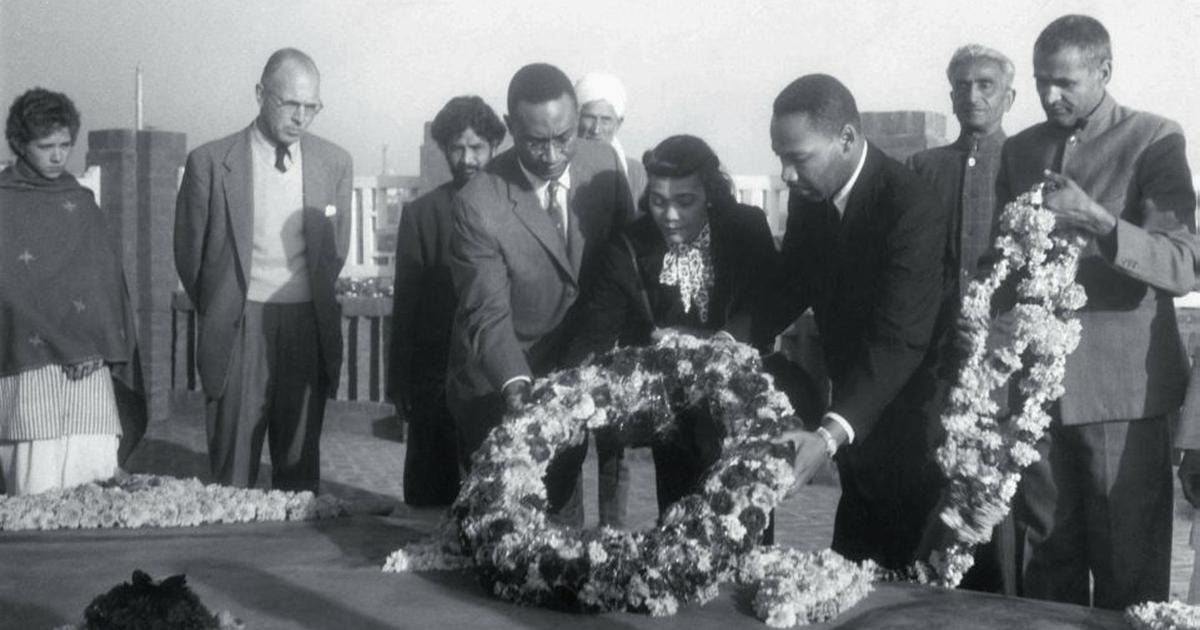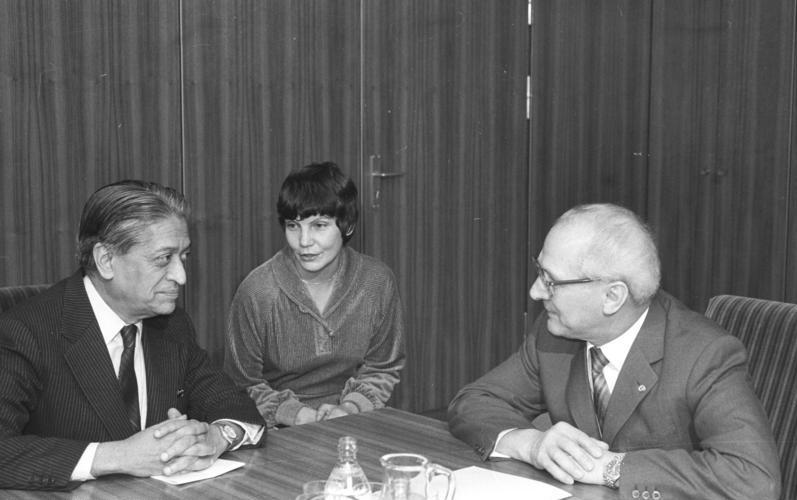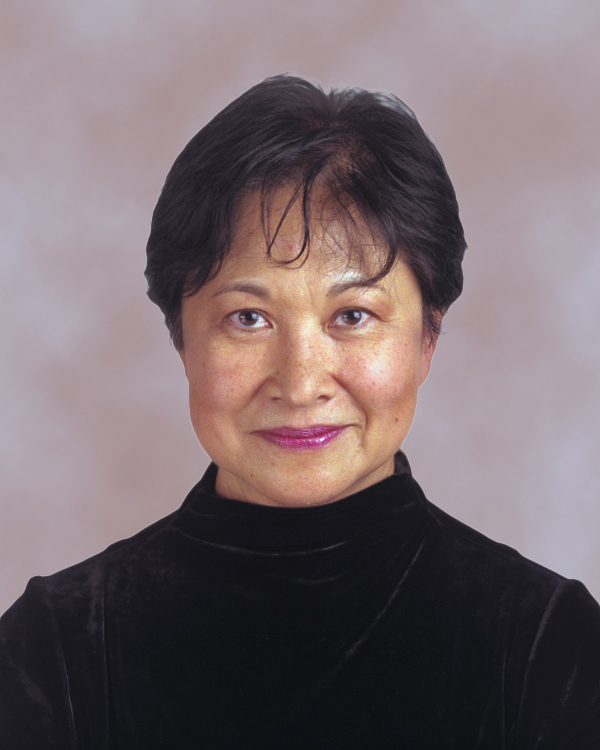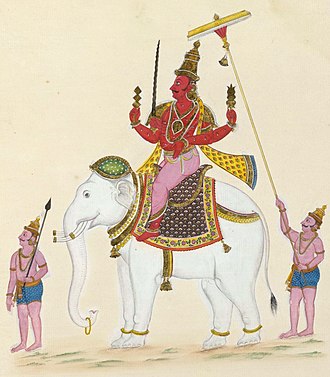Long Live Mahatma Gandhi and Martin Luther King Jr.
Context for the context: This blurb will become clearer when you read the ‘context’ one before the second essay in this post starts. After I had published my last post for my now-deleted Substack, passive-aggressively titled “I Teach,” which was the drop of truth I had spent more than twenty-six years digging for, I had yet another existential crisis from drinking it. Now here I am, more than a month later, angrily and impulsively rebooting that essay and the first one I had written on that blog, “The Anti-Gandhism of Gandhi’s Cancelers,” because of this. No, I’m sorry, just, no. You are not going to be liberated by great and godly human beings and then immediately do the exact opposite of what they did in the name of what they did.

The Anti-Gandhism of Gandhi’s Cancelers
It’s been several years now that Gandhi’s status as the symbol of anti-imperialism and non-violent resistance has been besmirched by his most recent incarnation as a racist rapist. There are plenty of essays online contextualizing his racist remarks within the context of his development as a human being. A quick Google search will yield those essays. I would like to particularly highlight the one written by E.S. Reddy, a revolutionary in his own right. It is a commentary on Gandhi’s racism. Another short, reluctant opinion piece acknowledges that Gandhi induced his young female disciples (including his nieces) to sleep naked beside him as a ‘test’ of his purity, but ponders whether this warrants going from absolutely deifying him (which Gandhi himself detested and discouraged) to absolutely demonizing and rejecting him and everything he stood for. My opinion on the matter is largely in agreement with both. I am biased, however, because I do still believe his title of “Mahatma,” the great one, is extremely appropriate, and it’s not what you think. The honorific does not halo someone who had completely shed all traces of prejudice, any potential to blunder and thus transcended his humanity, but someone who, by the time of his murder, fervently believed that constantly striving to do so was part of the path towards liberation.
This essay is not yet another historical contextualization. The fact that I gestured to them in the first paragraph feels a bit degrading, but you have to start digging at the surface to unveil the core. My commentary about all that will cease here. I would like to offer a different contextualization, one that comments on what branding Gandhi as a racist rapist says about us and what we lose when we do so. I am especially speaking of South Asian Americans, but broadly, I mean every human being who stands to gain from the world that Gandhi envisioned. Which is every human being.
Something we lose in the competition to see who among us young South Asian Americans can disparage the Indian most representative of India who ever lived is our understanding of humanity in all its flaws. The campaign against Gandhi arose in the past several years, in which liberal “activism” entails canceling someone who has ever strayed from uber-tolerance. This form of “activism” undermines the truth that human beings, as a rule, are unbelievably flawed, but what makes us human is our capacity to learn from our mistakes and grow. Gandhi certainly did this on a number of fronts, but for him, it wasn’t enough. The act of cancelation is deeply ironic considering the liberal push for restorative justice and an end to mass incarceration, but struggling with contradictions is not something activists of today practice too often.
Gandhi was abundantly clear about his “Himalayan blunders,” and I think this clarity has to do with his faith in all human beings to evolve morally. More precisely, that God resides in all human beings, and we must work tirelessly to reflect that truth through a life dedicated to service and guided by love for all. Although he was intensely self-critical, he was not self-deprecating. By being self-critical instead of self-deprecating, we separate our acts from our person, thus affirming that we will never lose the right to evolve morally by deepening our thoughts and thus reforming our actions; God will never leave our hearts. We are hypocrites if we don’t recognize this because we all stand to learn and grow as long as we live. As a teacher myself, I believe the whole point of life is to learn. That’s a different essay for another day.
I would like to address the profound and yet whispered concern that is on the minds of many non-Black people, especially young South Asians Americans, and that is the struggle to be a perfect ally to Black people. What I just said was a contradiction and speaks to my own previous thoughts on how no one is perfect nor ever will be, but everyone has the right to learn and grow. Because I described being an ally as a struggle, one cannot, by definition, be a perfect ally, but can always struggle towards the ideal of solidarity. This speaks to the flawed definition of solidarity we are prostrating ourselves before. Maybe that’s because the people who authorized it don’t know what they’re talking about. Or actually, maybe they do. Elites would never advise the type of solidarity that would threaten their own quarantine from the masses. I don’t care how “radical” they are. Real, true solidarity was the solidarity between the leaders of the Indian Independence Movement and the Civil Rights Movement, the solidarity between leaders cemented the solidarity between the led. The threads intertwining these movements and the people that composed them was one of intensely reflective and honest dialogue about collective liberation, not embarrassingly diplomatic platitudes mouthed from one quarter to another in order, staying safely unproblematic and stunted.
The revolutionary solidarity between the two most powerful social movements of the twentieth century is personified through the deep influence Gandhi had on Martin Luther King Jr. was based on a consciousness of the common humanity between different groups of the oppressed and between those groups and their common oppressor. Directing South Asian diasporic youth to not only reject Gandhi and his teachings, but also become the rank and file of the smear campaign against him is the greatest crime the global intellectual and activist, “anticolonial” elite continues to get away with. If you think propaganda is a thing of the past, think again. We have been fooled into vigorously rejecting the humanity of the person who strove more than anyone else. That’s breathtaking.
By we I am including myself, because as a wee student activist at Cornell trying to figure out who I was and what to do with my life, I consciously chose to not engage Gandhi because of what my fellow Indian American friends were saying about him. I didn’t even look into their claims. I didn’t want to be “problematic” and felt that even that conducting my own private research would be somehow wrong. I didn’t want to be “problematic” and wanted to fit in. I’m smiling as I write this because I am now very comfortable with being a problematic misfit, and in fact think it’s a requisite role for anyone genuinely interested in social change. The point is, I get the insecurity that comes with being different in a bad way or at the very least being perceived as such. This insecurity is especially sharp when you’re a young adult, a stage of life when you’re practically submerged in insecurity. I presume that if you know what I’m talking about, it is not detailed essays contextualizing Gandhi nor even the smear campaign against him that will move you. It is the affirmation that, yes, we are entitled to our own thoughts as well as our own voice, that uniquely human utterance. That’s exactly what the freedom fighters wanted people to realize about themselves, because without the people coming to this realization, nothing would change.
My aim with this essay is not to get you to venerate Gandhi, let alone abstain from trashing him. It is to reveal the truth that he and the other freedom fighters revealed to the unfree. No matter how crushed we are by the oppressive apparatus we live under, the human voice can never, ever be silenced. More precisely and profoundly, the human spirit can never, ever be extinguished. Like a diya, however, it must be lit first.
I Teach
Context: I had written these thoughts down last semester for a professor who was advising me on an independent study paper. I needed to outline an independent study paper that I would go on to complete this semester. The point was to establish a basic teaching identity and philosophy to build upon once I started teaching next year. Well, I just got hired. Actually, as a teacher at the high school I graduated from. I think that’s pretty cool. Anyways, I decided to post those thoughts here and updated them with this most recent development to celebrate it and mark where I start. Here’s hoping I don’t stop (burnout). I’m a rookie, so I don’t have the standing to say this, but I do feel that the way I’m thinking right now can be preventive to some extent, or at the very least prolong my tenure for as long as possible. Let’s see. For now, I just want to enjoy this moment. It took a minute to get here.
The first thing I want to establish is the concrete study I have done. I have read The Courage to Teach by Parker Palmer, The Human Revolution by Daisaku Ikeda, Education for Creative Living by Tsunesaburo Makiguchi, two volumes of The Moral and Political Writings of Mahatma Gandhi (a hefty trilogy, unfortunately UVA did not have the last volume in its library and the one I ordered got lost in the mail), and finally, Gandhi on Education, which is a collection of every meaningful statement Gandhi made about education throughout the one hundred volumes of his collected works. With all the books except for the latter, we will have to go by the trust system, because I just read them through without taking notes. I just wanted to have their insights trickle into my consciousness on for now.
Last time we talked about my independent study in the midst of one of my many existential crises throughout this past semester, we had decided that I would create a curriculum for a course on the Indian Independence Movement, the Civil Rights Movement, and the interconnections between them, especially through the writings and speeches of Gandhi and King. I wanted to teach the course to Indian American college-bound youth with the hope that they would imbibe and apply the lessons of those movements in their professional and personal lives, both in their present and future. Well, plans changed. Again. In short, my decision to again change course was due to Gandhi’s own instruction on how to live one’s life: focus on yourself. He called this focus self-realization, or realizing one’s own humanity. In terms of education, learning self-knowledge. This may seem selfish. Actually, it literally is. But contradictions govern society. After decades in the trenches, Gandhi was fond of saying he barely had thoughts anymore. Actions mostly just issued out of his body. There was something going on up there, but it wasn’t his voice. It was the voice of God. God was using him. Gandhi strove to be God’s instrument as much as he could and he understood that meant honing in on God’s voice as much as possible. Maya, my sister’s name, very loosely translates to the illusory nature of God’s magic. God’s magic show. Things are not what they seem.
For Gandhi, finding God means unveiling maya: seeing through the lies that a Godless society was both built upon and continues to stand upon and yet still magically yields to God’s truth. He oftentimes said Truth is God and God is Truth. He moved from using one of those more frequently over time, I forget which. Thus, to realize one’s own humanity, to know the truth, meant dissolving oneself into all of humanity. On a deeper level, into all beings. On an even deeper level, into God. It is more accurate to say that God’s voice in Gandhi’s head was conducive to its ultimate purpose: craft him into an increasingly refined instrument of God. Perhaps Gandhi was the person who was the closest to achieving perfect instrumentality. Actually, maybe he was just the most visible. Anyways, I have decided to also strive to forever act as God’s instrument to realize my own humanity, to know the truth, to know God.
From a Western perspective (or let’s just say how I learned it here), realizing one’s own humanity is akin to pure individualism. My way or the highway. Forget saying Gandhi’s notion of human agency deviates from the most popular one. If I said God’s voice was guiding me now, a good Samaritan would try to get me screened for schizophrenia, given that I was present enough to consent. Regardless, I have adopted it as my own MO, as a teacher but also as an individual for as long as I live. Because of this, I have definitively rejected the need for a savior complex to do this work, or at the very least vanquish it whenever it rears its ugly head. Doing what you were put on this earth to do doesn’t make you a martyr. It doesn’t even make you exceptional. The tragedy is that it is deemed as such.
After an untold amount of years on prestigious higher education land that, in case you forgot, was forcibly taken from Native Americans, I am done seeing and feeling the disconnect between college students discussing and besting each other at social justice and those in social injustice. In the service-learning literature (I was in the service-learning program at Cornell which got me thinking about things) this is known as the “chameleon complex.” Now I just understand it as being whiplashed when moving between worlds, or across streets. Because of this and my own selfish desire to know God, I completely forsake any duty to who people think my people are. “Indian American” is a great way for me to tell you where I was born and/or currently live and where my ancestors came from. But at this point, college-bound Indian American youth and their older siblings are simply too far gone to feel Gandhi’s teachings and transform themselves and their lives accordingly. Sure, they could master the concepts inside and out. They could get an A in my course, forget that it wouldn’t even be for a grade. They were primed to join the ranks of the professional-managerial class ever since they stepped into a classroom. Probably before they could crawl. When I realized that a pre-law student can somehow get a 4.0+ GPA in a major, doing mindbreaking work getting what is ostensibly a world-class education in social justice, and yet feel no disconnect between it and their single-minded goal of attending the highest ranking US News law school they can get into, that’s when I knew.
I will be a special education teacher at a low-income (poor) high school. “My people” are my students. They always will be. Going back to the savior thing, it’s not because I want to save the “at-risk.” I’ll just say that a school like mine is a place where I can teach and learn what I want to teach and learn. Truth. Teaching Gandhi’s teachings would not be by forcing my students to read his corpus, but by integrating them into my craft and who I am and who I’m becoming in general. I believe this I called “modeling” in the educational literature, but that is mostly just referring to lesson planning. The idea could be utilized beyond that. I feel like the best way to practice what you preach is to just practice and avoid preaching when and if you can. That’s just me.
There is some tragedy in the fact that my future students are in a place to feel Gandhi’s teachings. God plants the seeds of truth in the wretched of the earth. My specific task is to work with students who are particularly struggling with learning disabilities. Squeezing in Gandhi’s writings is probably out of the question. But if I do my best, I won’t even have to.
EducationArticles from Nethan Reddy
View blog
I recently attended an online presentation put on by the Committee for the Friendship of Indian and ...

How Do We Teach Moral Brilliance · Nethan Reddy and Nadinne Cruz · October 2, 2022 · Here is my (Net ...

"[Unity Reed High School] (URHS) in Manassas graduated its class of 2014 Wednesday evening at Jiffy ...
You may be interested in these jobs
-
Be a Travel Behavioral Health Hero in Helena, MT #TravelHero #BehavioralHealthRN #Helena
Found in: Ziprecruiter Test15 US C2 - 3 days ago
Sunbelt Staffing Helena, United StatesJob Description · Job DescriptionMinimum 1+ years nursing experience required. · Be a Travel Behavioral Health Hero in Helena, MT#TravelHero #BehavioralHealthRN #Helena · Sunbelt Staffing is searching for a dedicated Travel Behavioral Health RN to join our team in Helena, Montana ...
-

Senior Project Manager
Found in: Click to Hired US C2 - 4 days ago
Mansell Homes Irvine, United StatesBecome Part of Our TeamAs an industry leader Balfour Beatty offers employees a comprehensive benefits package with competitive salaries and more including:Medical, Dental, Vision and Life Insurance Health Savings Account401(k) with company matchFlexible Spending Accounts (Depende ...
-
speech pathologist
Found in: Careerbuilder One Red US C2 - 4 days ago
FullBloom Schaumburg, IL , USA, United StatesWhy Join Us · Are you looking for a new opportunity to make an impact in the lives of students? Join us at SESI Schools, where we are proving what is possible for students with unique needs. We offer · * Competitive salary · * Comprehensive benefits package including medical, den ...


Comments